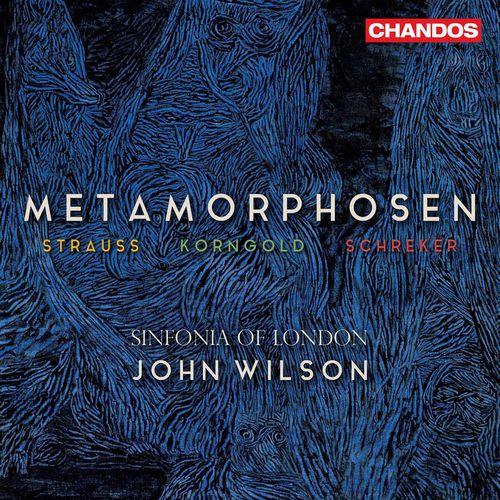Metamorphosen: Works by R. Strauss, Korngold & Schreker
Sinfonia of London, John Wilson

Metamorphosen: Works by R. Strauss, Korngold & Schreker
Sinfonia of London, John Wilson
Following their critically acclaimed album of English Music for Strings, Sinfonia of London and John Wilson turn to Germany and three outstanding works for string orchestra.
Franz Schreker’s Intermezzo, the oldest piece here, was composed in 1900, before Schreker’s rise to fame in the opera houses of Germany and Austria, but shows strong indications of what was to follow. Korngold composed the Symphonische Serenade following his return to Vienna from Hollywood after the Second World War, and shortly before he wrote his Symphony in F sharp. Korngold effortlessly conjures a vivid range of colours and textures from his large forces (32 violins, 12 violas, 12 cellos, and 8 basses) in a work that explores the virtuosity of the players to the full.
Composed in 1945, as a reaction to the horrors of the war, and the desecration of German culture, Richard Strauss’s Metamorphosen for 23 solo strings seems to look backwards to the German romantic tradition (a trait even more evident in his Four Last Songs, of 1948). The moving final passage, marked ‘In Memoriam’, leaves the listener to contemplate in silence.
Review
Kate Rockstrom
When you think of Richard Strauss you think of lush Romantic works, big orchestral moments and dramatic opera. While his work, Metamorphosen, uses all those skills, it is something else – a strangely gentle meditation on life and death and a reflection on the desecration that World War II inflicted upon the world. Strauss passed away in 1949 and you can feel the full might of his compositional maturity in this delicate and beautiful work.
Complementing this work are two other ‘German’ composers, Franz Schreker, an Austrian-Jewish composer whose compositional style can be described as ‘aesthetic plurality’, and Eric Korngold, another Austrian, who eventually became a US citizen. Both however rooted their compositional style in the same Germanic traditions that Strauss celebrates and mourns in his work. I have always adored Korngold’s Hollywood inspired orchestral works and was delighted to hear the appealing Symphonic Serenade, Op. 39, with each movement exploring a different sound world and testing the ability of the musicians both technically and musically.
I had not heard of Franz Schreker and once I started research, I understood why. He was one of many composers almost completely erased from the cultural memory due to the rise of Nazism. At the height of his popularity, he was tipped as one of the most promising composers of the 20th century, but by 1932, anti-Semitism derailed his career and he died shortly after and was mostly forgotten. Known during his life for his operatic compositions, his work for string orchestra was written earlier, in 1900, before his rise to fame. It starts eerily at the top of the range of the violin and blossoms outwards across the orchestra. Throughout the work is the word ‘espressivo’, expressively, which means to use warm sound, lots of vibrato and emotion. The Sinfonia of London do just that and bring to life a composer I hope to hear more of in the future.
Kate Rockstrom is a friend of Readings
This item is not currently in-stock. It can be ordered online and is expected to ship in approx 4 weeks
Our stock data is updated periodically, and availability may change throughout the day for in-demand items. Please call the relevant shop for the most current stock information. Prices are subject to change without notice.
Sign in or become a Readings Member to add this title to a wishlist.


